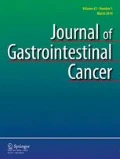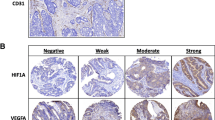Abstract
Introduction
Colorectal cancer (CRC) incidence is increasing globally. It is ranked as the second most common cancer in women and the third most in men. Angiogenesis plays a significant role in the development and spread of colorectal cancer. Angiogenesis has been proposed as a prognostic marker in a variety of human neoplasms. In this regard, markers of angiogenic endothelial cells are emerging as targets for cancer therapy.
Aim of the Work
The aim of this study is to evaluate the prognostic impact of tumor angiogenesis assessed by microvessel density (MVD) counting using CD31 and CD105 along with VEGF immunostaining in colorectal cancer patients.
Methods
VEGF, CD31, and CD105 expressions were evaluated using immunohistochemical staining in 50 patients with colorectal cancer. The relationship between their expressions and clinicopathological factors and outcome of patients were analyzed.
Results
The VEGF expression (70% of the cases) correlated significantly with larger tumor size, higher grade, and advanced tumor stage (p = 0.006, p < 0.001, p < 0.001), respectively. The mean MVD was 24.2 ± VMD by CD105 (p = 0.10.65 019 for CD105, 19.2 ± 8.41 for CD31, respectively. MVD by CD31 (p = 0.023)) and was significant predictive factors for overall survival. Furthermore, the VEGF expression (p = < 0.001) was a significant predictive factor for DFS. There was a statistically significant association between the recurrence rates with both VEGF and CD105 (p < 0.001) but not significant with CD31.
Conclusion
CRC patients with high VEGF, CD105, and CD31 expression showed poor prognosis. The immunohistochemical markers could be used for stratification of patients into low-risk and high-risk groups.


Similar content being viewed by others
References
Abdel Dayem HM, Abd El All HS, Kamel AA, Yossef WT, Hamma MM. Correlation of vascular endothelial growth factor expression and neovascularization with colorectal carcinoma: a pilot study. J Adenocarcinoma. 2016;1(1):5. https://doi.org/10.21767/2572-309X.10005.
Abdelzaher E, El Deeb NM, Gowil AG, Yahya. Biological and demographic profile of meningiomas in a cohort of Egyptian patients: impact on tumor recurrence. Sci World J. 2013;2013:375139. https://doi.org/10.1155/2013/375139.
Bendardaf R, Buhmeida A, Hilska M, et al. VEGF-1expression in colorectal cancer is associated with disease localization, stage, and long-term disease-specific survival. Anticancer Res. 2008;28(6B):3865–70.
Bergers G, Benjamin LE. Tumorigenesis and the angiogenic switch. Nat Rev Cancer. 2003;3:401–410.
Cammarota R, Bertolini V, Penne G. The tumor microenvironment of colorectal cancer: stromal TLR-4 expression as a potential prognostic marker. J Transl Med. 2010;8:112.
Carmeliet P. VEGF as a key mediator of angiogenesis in cancer. Oncology. 2005;69:34–10.
Chen YB, Wan DS, Zhan YQ, Zhou ZW, Li W, Chen G. Correlation of tumor microvessel density to metastasis and recurrence of rectal cancer. Ai Zheng. 2004;23:1203–6.
Chung J, Braunschweig T, Hong S, et al. Assessment of vascular endothelial growth factor in formalin fixed, paraffin-embedded colon cancer specimens using a well-based reverse phase protein array. Proteome Sci. 2014;12:27.
Dallas NA, Samuel S, Xia L, et al. Endoglin (CD105): a marker of tumor vasculature and a potential target for therapy. Clin Cancer Res. 2008;14(7):1931–7. https://doi.org/10.1158/1078-0432.CCR-07-4478.
Dassoulas K, Gazouli M, Theodoropoulos M, et al. Vascular endothelial growth factor and endoglin expression in colorectal cancer. J Cancer Res Clin Oncol. 2010;136(5):703–8.
Deliu C, Ciurea P, Neagoe D, et al. Evaluation of Angiogenesis in Colorectal Cancer. Current Health Sciences. 2015;41(2).
Deliu IC, Neagoe CD, Beznă M, et al. Correlations between endothelial cell markers CD31, CD34 and CD105 in colorectal carcinoma. Rom J Morphol Embryol. 2016;57(3):1025–30.
Ferroni P, Palmirotta R, Spila A, Martini F, et al. Prognostic value of carcinoembryonic antigen and vascular endothelial growth factor tumor tissue content in colorectal cancer. Oncology. 2006;71:176–84.
Gulubova M, Vlaykova T. Prognostic significance of mast cell number and microvascular density for the survival of patients with primary colorectal cancer. J Gastroenterol Hepatol. 2009;4(7):1265–75.
Hamilton SR, Vogelstein B, Kudo S, Riboli E, Nakamura S, et al. World Health Organization Classification Of Tumours: Pathology and genetics of tumors of the digestive system. Lyon: IARC Press; 2000. p. 104–143.
Hanahan D, Weinberg RA. Hallmarks of cancer: the next generation. Cell. 2011;144(5):646–74.
Hashim AF, Al-Janabi AA, Mahdi LH, et al. Vascular endothelial growth factor (VEGF) receptor expression correlates with histologic grade and stage of colorectal cancer. Libyan J Med. 2010;5 https://doi.org/10.3402/ljm.v5i0.5059.
Jemal A, Siegel R, Ward E, Hao Y, Xu J, Thun MJ. Cancer statistics. CA Cancer J Clin. 2009;59:225–49.
Jamshidi S, Zargaran M, Baghaei F, et al. An immunohistochemical survey to evaluate the expression of CD105 and CD34 in ameloblastoma and odontogenic keratocyst. J Dent (Shiraz). 2014;15(4):192–8.
Jung I, Gurzu S, Ranica M, et al. The differences between the endothelial area marked with CD31 and CD105 in colorectal carcinomas by computer-assisted morphometrical analysis. Romanian J Morphol Embryol. 2009;50(2):239–43.
Kannarkatt J, Joseph J, Kurniali PC, et al. Adjuvant chemotherapy for stage II colon cancer: a clinical dilemma. J Oncol Pract. 2017;13(4):233–41. https://doi.org/10.1200/JOP.2016.017210.
Khorana AA, Ryan CK, Cox C, Eberly S, et al. Vascular endothelial growth factor, CD68, and epidermal growth factor receptor expression and survival in patients with Stage II and Stage III colon carcinoma: a role for the host response in prognosis. Cancer. 2003;97:960–8.
Li C, Gardy R, Seon BK, et al. Both high intratumoral microvessel densities determined using a CD105 antibody, and elevated plasma levels of CD105 in colorectal cancer patients correlate with poor prognosis. Br J Cancer. 2003;88:1424–31.
Minhajat R, Mori D, Yamasaki F, et al. Endoglin (CD105) expression in angiogenesis of colon cancer: analysis using tissue microarrays and comparison with other endothelial markers. Virchows Arch. 2006;448(2):127–34. Epub 2005 Sep 22
Mohamed AH, Abd El All SH, Kamel AA, et al. Correlation of Vascular Endothelial Growth Factor Expression and Neovascularization with Colorectal Carcinoma: A Pilot Study .journal of adenocarcinoma. 2016;1(1):5
Mokhtar N, Gouda I, Adel I. Cancer pathology registry (2003–2004) and time trend analysis. In: Mokhtar N, Gouda I, Adel I, editors. Malignant digestive system tumors. Cairo: NCI, Elshere press; 2007. p. 55–67.
Nakayama H, Enzan H, Miyazaki E, et al. Differential expression of CD34 in normal colorectal tissue, peritumoral inflammatory tissue, and tumourstroma. J Clin Pathol. 2000;53(8):626–9.
Raica M, Cimpean AM, Ribatti D. Angiogenesis in pre-malignant conditions. Eur J Cancer. 2009 Jul;45(11):1924–34.
Redston M. Epithelial neoplasm of the large intestine. In: Odze RD, Goldblum JR, Crawford JM (eds). Surgical pathology of the GI tract, liver, biliary tract, and pancreas. Philadelphia: Saunders; 2004. p. 441–472
Saad RS, Jasnosz KM, Silverman JF. Endoglin (CD105) expression in endometrial carcinoma. Int J Gynecol Pathol. 2003;22:248–53.
Saad RS, Liu YL, Nathan G, et al. Endoglin (CD105) and vascular endothelial growth factor as prognostic markers in colorectal cancer. Mod Pathol. 2004 Feb;17(2):197–203.
Saad RS, El-Gohary YL, Memari E, Liu YL, Silverman JF. Endoglin (CD105) and vascular endothelial growth factor as prognostic markers in esophageal adenocarcinoma. Hum Pathol. 2005;36:955–61.
Schoenleber SJ, Kurtz DM, Talwalkar JA, Roberts LR, et al. Prognostic role of vascular endothelial growth factor in hepatocellular carcinoma: systematic review and meta-analysis. Br J Cancer. 2009;100:1385–92.
Soumaoro LT, Uetake H, Higuchi T, Takagi Y, et al. Cyclooxygenase-2 expression: a significant prognostic indicator for patients with colorectal cancer. Clin Cancer Res. 2004;10:8465–71.
Takahashi N, Kawanishi-Tabata R, Haba A, et al. Association of serum endoglin with metastasis in patients with colorectal, breast, and other solid tumors, and suppressive effect of chemotherapy on the serum endoglin. Clin Cancer Res. 2001;7(3):524–32.
Tien YW, Chang KJ, Jeng M, et al. Tumor angiogenesis and its possible role in intravasation of colorectal epithelial cells. Clin Cancer Res. 2001;7(6):1627–32.
Uribarrena AR, Ortego J, Fuentes J, et al. Prognostic value of microvascular density in Dukes A and B (T1–T4, N0, M0) colorectal carcinomas. Gastroenterol Res Pract. 2009;2009:679830.
Wang Y, Yao X, Ge J, et al. Can vascular endothelial growth factor and microvessel density be used as prognostic biomarkers for colorectal cancer? A systematic review and meta-analysis. Sci World J. 2014:102736.
Weidner N. Current pathologic methods for measuring intratumoral microvessel density within breast carcinoma and other solid tumors. Breast Cancer Res Treat. 1995;36:169–80.
World Health Organization. International Agency for Research on Cancer. Colorectal Cancer: Estimated Cancer Incidence, Mortality and Prevalence Worldwide in 2012. International Agency for Research on Cancer. Available at http://globocan.iarc.fr/Pages/fact_sheets_cance r.aspx. Accessed July 1, 2014.
Funding
This research received no specific grant from any funding agency in the public, commercial, or not-for-profit sectors.
Author information
Authors and Affiliations
Corresponding author
Ethics declarations
Conflict of Interest
The authors declare that they have no conflict of interest.
Rights and permissions
About this article
Cite this article
Mohamed, S.Y., Mohammed, H.L., Ibrahim, H.M. et al. Role of VEGF, CD105, and CD31 in the Prognosis of Colorectal Cancer Cases. J Gastrointest Canc 50, 23–34 (2019). https://doi.org/10.1007/s12029-017-0014-y
Published:
Issue Date:
DOI: https://doi.org/10.1007/s12029-017-0014-y




